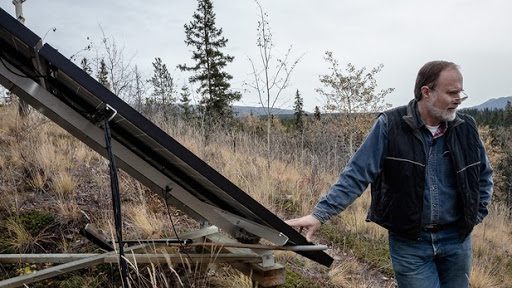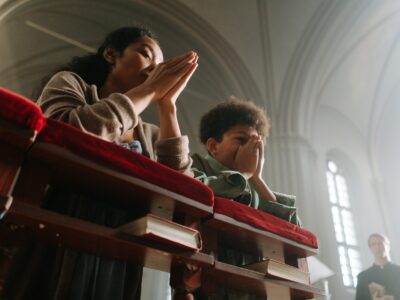Every morning after the kids leave the house for school, I walk from room to room and switch off the lights left on from their early morning getting ready routine. It’s the small part I play to reduce our monthly electricity bill. I smile and talk to the fish in our aquarium. I make a second cup of decaf espresso and sip it with gladness. I take a quick snapshot of the evolving world outside my office window for its new light on this new day, and then I sit down to begin the work that pays for our heat, water, food, electricity, and shelter.
I can tell you with certainty that the origins of all these resources is foreign to me. This is not the case for the people featured in the documentary, Life Off Grid.
Life Off Grid: What to Expect
Life Off Grid is a beautiful, inspiring, and challenging documentary directed by Jonathan Taggart, now streaming on Amazon. Spanning the width of Canada, the film explores stories of people who live “off the grid,” in the wilderness, where traditional sources of electricity don’t yet reach, or won’t, because it is too cost prohibitive. Unlike survivalists or doomsday preppers, the majority of these folks have chosen to live off the grid because the place they want to live—the wilderness—is off the grid, not because they see the world’s imminent end in sight or want to be ready for the zombie apocalypse. Their motivation is not fear for the end, but rather love for the earth and a sense of responsibility to care for God’s creation.
The documentary highlights the ways individuals who live off the grid build their houses, generate power, secure water, heat their homes, feed their families, handle waste, and make a living. If you’ve at all romanticized the idea of living off grid, this documentary does a fine job of bringing the reality of off-grid life into focus — it is hard. There might be parts of it that are more economical, but it isn’t cheap. You might be removed from many of the distractions of life on the grid, but that doesn’t mean you have more time.
As one off-grid individual in the Yukon Territory explains, “There’s a certain amount of let’s see how little I can get by with. Let’s see how basic, or simple, I can make my life and still be happy and comfortable. It’s equal parts necessity and philosophy.”
Isn’t that a grand thing to aspire to, even if we aren’t quite ready to take the leap to off-grid life? How can we reshape our way of thinking about what we consume, consider where things come from and what they actually cost, and out of that intention, live a little bit simpler?
Finding the Love: Faithifying Your Viewing
Let’s face it: everyone in the Bible lived off the grid. Light switches weren’t left on in every room of the house. Heat wasn’t controlled by a thermostat. Water didn’t just come out of a faucet. Waste didn’t just… go away. The Teacher in Ecclesiastes insists that nothing is new under the sun, but actually, Teach, there’s a whole lot that’s new under the sun these days.
What isn’t new is the degree of intention we bring to the way we live our lives.
The Teacher in the Book of Ecclesiastes spends the entire twelve chapters wrestling with the meaning of life. He tries out prosperity, wisdom, folly, and power, and at the end of the day, he determines that it’s all meaningless. Meaningless, meaningless, everything is meaningless! he cries in repeated refrain throughout the book. Good or bad, smart or not quite with it, king of the board room or board room gofer, at the end of the day, everyone dies and no one remembers the last generation.
He’s a real glass-is-half-full type of guy, that Teacher.
We have new tools at our disposal to live a prosperous life. We have new distractions and new packaging for the temptations that have always been common to men. We have new titles to label the people who hold the power and new categories in which we place the oppressed. But underneath all of the shiny newness, the same old questions still sing: What is the meaning of life? Why should I work so hard? What is the point of all of this?
In between his cries of “Meaningless!” the Teacher offers wisdom proverbs on what to make of life, given its apparent meaninglessness. Honestly, who can live with that refrain anyway? What are we supposed to do, as Mary Oliver once wrote, with our “one wild and precious life?”
The folks interviewed in Life Off Grid have chosen to live a life as independent from others as possible. They do not want to rely on a corporation or government for their sustenance. Meaning, for many of them, is about self-reliance. As followers of God, we are called to rely on God and to serve one another. How does one keep warm alone, asks the Teacher, two can defend themselves; a cord of three strands is not easily broken.
We need each other, off the grid or on it. God and gratitude and the gifts of community give us meaning.
The Teacher’s conclusion after all of that spinning in meaninglessness is, “Go, eat your food with gladness, and drink your wine with a joyful heart, for God has already approved what you do. Always be clothed in white, and always anoint your head with oil. Enjoy life with your wife, whom you love, all the days of this meaningless life that God has given you under the sun—all your meaningless days. For this is your lot in life and in your toilsome labor under the sun. Whatever your hand finds to do, do it with all your might, for in the realm of the dead, where you are going, there is neither working nor planning nor knowledge nor wisdom” (Ecclesiastes 9:7-10).
So now go, reduce your carbon imprint, recycle your recyclable plastics, flick off the lights left on, for God has already approved what you do. Put your back into whatever good work God has given you under the sun, whether that’s installing solar panels or planting a backyard garden, soak up that beautiful sun, and be glad.





 Copyright
2024
Root and Vine
Copyright
2024
Root and Vine